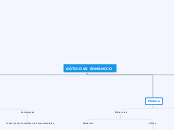FUNDAMENTOS DEL ARTE I
The part of speech is a category to which a word is assigned according to its syntactic functions. In English the main parts of speech are noun, pronoun, adjective, determiner, verb, adverb, preposition, conjunction, and interjection.
Edad Media (476 d.C - 1492)
A numeral is a word or phrase that describes a numerical quantity.
Some theories of grammar use the word 'numeral' to refer to cardinal numbers that act as a determiner to specify the quantity of a noun, for example the 'two' in 'two hats'.
Gótico
Mudejar
Románico
An article is a word used to modify a noun, which is a person, place, object, or idea. Technically, an article is an adjective, which is any word that modifies a noun.
Edad Antigua (3.000 a.C - 476 d.C)
Grecia
Roma
Egipto
Prehistoria (5.000 a.C - 3.000 a.C)
A conjunction is a word like 'if' 'but' or 'and' which is used to connect sentences or clauses together.
Neolítico
Paleolítico
Edad Contemporánea (1789 - actualidad)
Neoclasicismo
An interjection is used to express emotion in a sentence.
Think of other interjections!
Edad Moderna (1492 - 1789)
Barroco
Renacimiento
An adverb is used to describe a verb, but it can also describe an adjective or another adverb.
Adverbs normally help paint a fuller picture by describing how something happens.
Cinquecento
Pintura
Escultura
Quatroccento
Arquitectura









